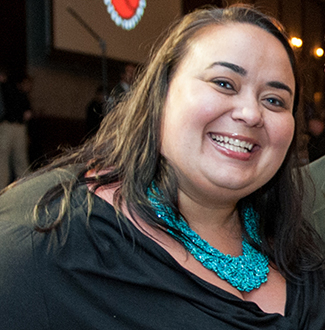
Eden Strunk
Most students give their teachers gifts of coffee mugs, chocolate, or flowers. This year, Eden Strunk’s students pooled their resources and found her a Cambodian genocide survivor to speak to the class.
Strunk had inspired them to care about human rights and genocide just as she inspired Ruth Hernandez, a ninth grader at Esperanza Charter Academy in Philadelphia who won USC Shoah Foundation’s first-ever IWitness Video Challenge last year. Strunk had assigned the challenge to her “advisory” class – a course devoted to getting students more engaged in their school and community.
Though Hernandez was the only one in the class to actually complete the project, she ended up winning the national IWitness Video Challenge competition. Her film, Voices of Our Journey, is about how she was inspired by testimony of immigrants during the Holocaust to participate in the “New Sanctuary” movement for immigration reform in Philadelphia.
As part of Hernandez’s prize, Hernandez and Strunk were flown to Los Angeles last May to attend the 2014 Ambassadors for Humanity Gala honoring President Barack Obama. Hernandez also traveled to Poland in January on USC Shoah Foundation’s Auschwitz: The Past is Present program as a Junior Intern.
“Ruth is an amazing young lady and an amazing individual,” Strunk said, and added that just last week she and Hernandez were invited to hear an Auschwitz survivor speak at Har Zion Temple in Philadelphia. Hernandez’s dad, who is featured in Voices of Our Journey, attended as well and found the experience particularly special, Strunk said.
“It was the first time her dad was able to see how people really admire her and what she was able to accomplish,” she said.
Strunk has assigned the challenge again this year, this time to her AP World History students. She said the challenge appeals to her because it gets students involved in their community and shows them that they really can make a difference.
Her students are working on projects ranging from religious persecution to identity formation in foster kids. While it can be tough for them to figure out what their “call to action” in the community will be, Strunk said that’s actually an important struggle young people need to face.
“So many youth say ‘Oh, when I’m older, when I have money,’ but not realizing what power you have now and how you can use that in a positive way,” she said.
Clearly, Strunk’s strategy is working. After taking the class to a youth symposium on the Holocaust, showing them interviews with local Holocaust survivors and inviting a Sudanese “Lost Boy” to speak as part of their study of genocide, she was touched when they told her they had found a Cambodian Genocide survivor who had agreed to come speak to the class. She said it’s amazing to watch her students embrace the lessons of genocide, human rights and community action.
“As a teacher you couldn’t be prouder than to see your students get an in-depth view of who they are and how they fit into their community,” Strunk said. “To see them be able to reach out and help someone else and see them connect with things, especially when they see things that aren’t right in the world around them, and be able to talk about it and find a free and safe space to voice their opinions, and learn how to have their voices heard.”